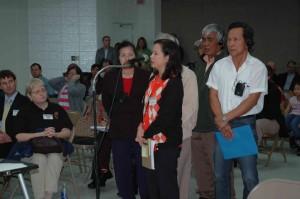Members of the public shared their reactions to the Phase I Draft Early Restoration Plan and Environmental Assessment (Phase I DERP/EA) at public meetings in the Gulf states and Washington, DC, in January and February 2012. More than 750 people attended the meetings.
The trustees responsible for restoring the natural resources injured by the Deepwater Horizon Oil Spill listened as the public commented on the initial $57 million round of early restoration projects proposed under a $1 billion agreement with BP announced in April 2011. The Phase I DERP/EA is available online (PDF, 126 pages) and at public repositories (xls, 26 KB) across the Gulf states.
During a 60-day period in which the public was encouraged to review and comment on the proposed plan, more than 500 people submitted comments: 120 gave verbal comments at the public meetings, and about 400 comments were received online and via mail. The comment period ended Feb. 14, 2012. All comments will be reviewed and considered before a final plan is presented to the public.
The Phase I DERP/EA is the first in an anticipated series of plans to begin restoration of the Gulf of Mexico to compensate for natural resource injuries, including the loss of human use of Gulf resources, from the spill.
There are eight proposed projects for this phase of the early restoration, two each in Alabama, Florida, Louisiana and Mississippi. They include shoreline marsh creation, coastal dune habitat restoration, nearshore artificial reef creation, oyster bed restoration and construction of boat ramps. While there were no Texas-based projects proposed for Phase I of the DERP/EA, trustees for that state expect to propose several projects in the next phase of early restoration.
The meetings were covered by newspapers, radio and television:
- Pensacola News Journal
- WEAR ABC 3
- KLFY Eyewitness News
- WLOX 13
- The Mississippi Press
- The Associated Press
- Mississippi Public Broadcasting
- Sun Herald
- Fox 10 TV
- WKRG News
- KUHF
- Texas Tribune
- The Galveston Daily News
- The Daily Comet
- The New Orleans Times-Picayune
- Houma Today
After consideration of each comment received, the trustees will finalize approved projects with BP. The Final Phase I Early Restoration Plan and Environmental Assessment will include the agreed upon projects, a summary of public comments and trustee responses, and environmental analysis.
Sign up for NOAA's email list to receive the latest updates.


